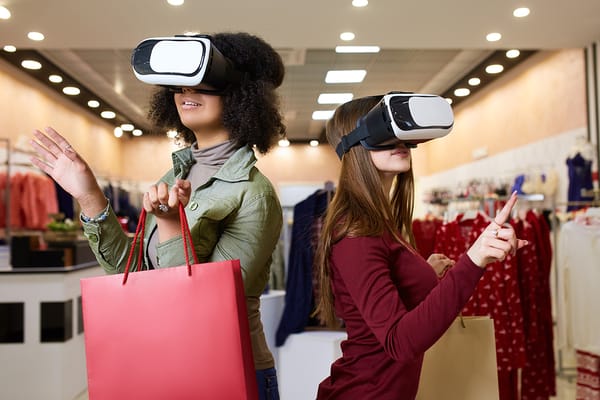We’re running a series of predictions for the ecommerce and multichannel retail industry in 2022 and beyond. Today we bring together comments from industry figures say about evolving technology in the retail sector and how it could be used in the future.
AI to address labour Shortages
“Amid a shortage of labour and increased customer demand for faster service, quick-service restaurants will employ AI for automated order taking. Thanks to advancements in natural language understanding and speech, combined with recommendation systems, fast food restaurants will roll out automated order taking to speed drive-through times and improve recommendations. In supermarkets and big-box stores, retailers will increase their use of intelligent video analytics and computer visions to create automated checkouts and autonomous or cashier-less shopping.”
Azita Martin, VP & GM of Artificial Intelligence for Retail
Tech innovation will overhaul online and in-store customer service
“The last two years have taught us all the growing importance of a brand’s online customer experience. However, the innovative customer experience solutions designed to facilitate shifting needs or habits are still being discovered.
Over the last year, brands have continued to leverage technology in new and interesting ways to enhance both their in-store and online experience. Aldi’s checkout-free concept store and M&S’s same-day delivery service are testament to the capabilities of technology to enhance and transform customer service across all channels. In 2022, more and more brands will leverage technology solutions to create digital-first and checkout-free spaces in-store, and a level of service to match that of in-person sales assistants online.
According to our research, these advanced service solutions are exactly what consumers are calling for, with a quarter (25%) of UK shoppers agreeing that being able to ask questions and get guidance on site would make them more likely to purchase products that are challenging to buy. The lines between physical and digital retail are blurring, and forward thinking brands will make sure to embrace the best of both next year.”
Jack Wearne, CEO, Ve Global
Fluent, personalized support for other languages
“An advantage of ecommerce is the reach you have to customers all over the world, but with that comes the need to personalize messages globally. While English might be your first language, 1.1 billion people speak fluent Mandarin, another 527 million speak Spanish, and 422 million speak Arabic. Personalizing messages to customers in their local dialect through AI will be a large part of where we see chatbot development head in 2022.”
Douglas Dunlap, senior director of product marketing, ManyChat
Cloud adoption will accelerate, differentiate.
“From a technology standpoint, expect an acceleration of cloud adoption, which will be at the top of many companies’ priority list in 2022. Expect to see greater competitive division between people who do it successfully and those who stumble or fail to execute.
Additionally, businesses will focus on “feeding” ML and AI. When it comes to developing machine learning and artificial intelligence, consistent and readily available sources of data are critical. The more sources and streams, the better the experience will be.
The result of lining up these new tools and platforms is greater personalization for customers. The ability to create and deploy the immersive, personal experiences customers crave will determine who wins and loses as platform use becomes every bit as important – or more important – than in-store experience.”
Brandon Ashcraft, VP engineering, Mobiquity
Unified commerce experiences will replace siloed in-store experiential retail
“Prior to the pandemic, there was a lot of focus on creating experiential store concepts, almost as a way of trying to compete with the online channel. Fast-forward to 2022 and we’ll see retailers pursue holistic store experiences that are focused on helping shoppers transition between physical and digital interactions with their brand. One good example of this is a virtual closet, which would allow consumers to create a digitized representation of all the products they own from that retailer. And then, the virtual closet would be accessible to that retailer’s store associates so when the shopper is in the store, associates could recommend several items that would complement previously purchased items.”
Nikki Baird, VP of retail innovation at Aptos
At last, businesses of all sizes are benefiting from tech adoption
“When the world went online during the pandemic, technology helped businesses survive. In 2022, businesses will further push their use of tech, taking their investment to the next level. From restaurants to retailers, we’ll see businesses across industries digitally transform so that they can automate processes, save time and improve the customer experience. In fact, 71% of retailers said they are looking to inventory management technology to improve their supply chain efficiency, whilst 41% plan to invest in technology to show real-time inventory of their store. This appetite for adoption extends beyond the “traditional” areas of tech tools, with, for instance, 41% of businesses planning to invest in kitchen automation tech. This move shows that digital transformation will no longer be the purview of large enterprises, and instead it seeps through all aspects of business regardless of industry.”
Kaushalya Somasundaram, Head of UK Payments Partnerships & Industry Relations at Square
The future is headless
“Next year will see headless technology at the forefront of commerce. It means more flexibility, more integration and less siloed solutions and in the B2C world, it will make it easier to use social commerce and keep up with user interface trends. While consumer e-commerce has been much faster at adopting new technologies, in B2B many organisations are less agile. However, headless commerce will become critical even in business-to-business in 2022 as it will be the make or break of acquiring, retaining and engaging a business customer. Elsewhere the ongoing focus on consumer experience will bring more pressure on brands to work well with data, personalisation and a completely frictionless and smooth experience across different channels. We’ll also see more brands starting to integrate crypto into innovative rewards programs.”
Achille Traore, CEO, While Label Loyalty









